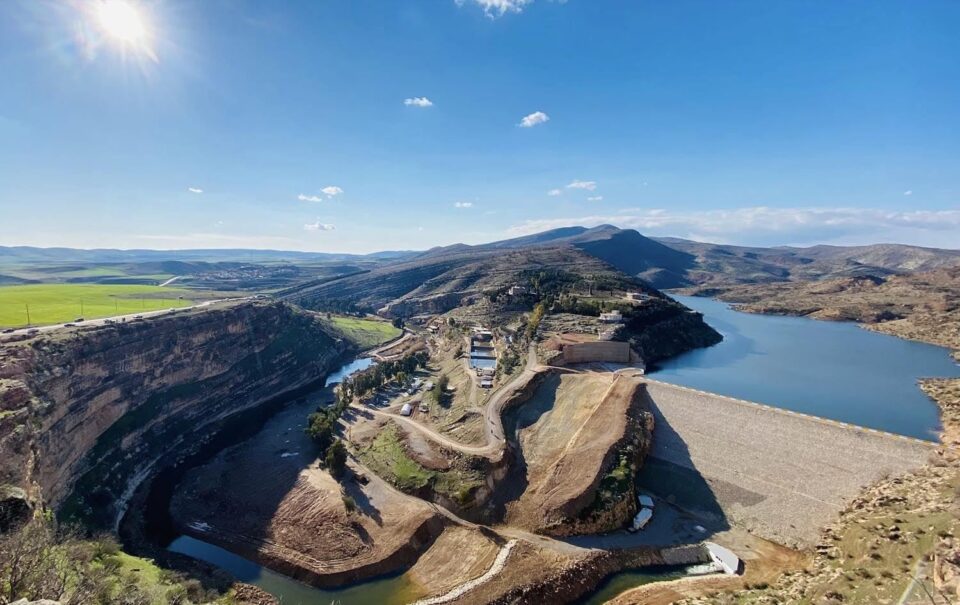Kurdistan’s ambitious dam projects are transforming rural life, combating drought, and protecting the region’s natural and cultural heritage.
Many Kurdish villages have been revitalized due to the construction of dams, which have contributed significantly to the region’s development. In total, 24 dams have been completed, although some have started to accumulate silt over time, reducing their water storage capacity. These dams have been instrumental in the restoration of villages around them, bringing life back to rural areas and helping to prevent migration from the countryside to urban centers. This shift has had a positive effect on preserving the cultural and economic fabric of these rural communities.
The Prime Minister of the Kurdistan Regional Government (KRG), Masrour Barzani, laid the foundation stone for the Dwin Dam in Erbil province on September 16, 2024. During the ceremony, he stressed the importance of this project for the region, stating, “This location is ideal for water absorption, and we have carefully revised the project design to ensure that it does not disturb any historical monuments in the area. At the same time, we’ve optimized the dam’s ability to capture and retain water.”
PM Barzani also emphasized the broader significance of the government’s strategic water management plan, remarking, “The water strategy we’ve adopted is critical for the present and future of our country. Capturing rainwater and spring water is one of the key steps in our battle against climate change and drought. We will continue to implement these plans, but we also call on our citizens to help maintain the cleanliness of our environment. Together, we can safeguard the Kurdistan Region’s stunning natural landscapes, transforming it into a prime destination for tourists from around the world.”
The construction of dams throughout the Kurdistan Region not only enhances water management but also supports tourism and agriculture, benefiting local economies. Many villages that were previously abandoned or in decline have been rebuilt as a direct result of these dams. The dams, aside from providing water resources, add to the scenic beauty of the region, making it more attractive to tourists and locals alike.
Rahman Khani, the Director General of Dams at the Ministry of Agriculture, shared further insights with The Kurdish Globe, explaining, “The foundation stone of the Dwin Dam was laid by the Kurdistan Prime Minister, marking another significant achievement in the KRG’s ongoing efforts to improve water management. This dam, which will be one of the largest in the country, is set to be completed this year. It is also close to Gomaspan Dam, which will also be finalized soon. These dams are part of the KRG’s broader strategy to build reservoirs and water collection systems that address both the immediate and long-term challenges of water scarcity and climate change.”
Khani also highlighted that the dam-building initiative is not limited to a single region but is ongoing across much of Kurdistan. He mentioned that 24 dams, designed to store significant amounts of water, will be completed by the end of the year. However, he pointed out that some dams still require additional funding to be finished. Key projects include two dams in Duhok province, along with the Zalan, Chaqchaq, Basara, and Bawanur dams in Sulaimani province, as well as the Khornawazan dam in Garmiyan. According to Khani, the KRG is actively working to secure the necessary financial resources to continue expanding dam infrastructure, particularly in areas most affected by drought and water shortages.
Additionally, the construction of these dams has had a profound effect on the livelihoods of local people. It has allowed many to remain connected to their ancestral lands, reducing the need for migration and contributing to economic stability in rural areas. The dams have also helped irrigate farmland, supporting livestock and crops, and enhancing productivity for farmers.
Khani concluded by noting the broader impact of these projects: “The dams have not only improved water availability but have also revived springs and boosted groundwater levels. Beyond that, they have improved the climate and attracted tourists to the region. They have created jobs and added value to farmers’ land.”
The Kurdish Globe

